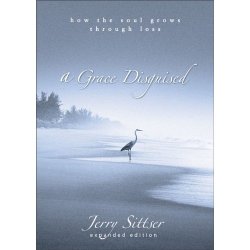Book Reviews (by Kim Gentes)
In the past, I would post only book reviews pertinent to worship, music in the local church, or general Christian leadership and discipleship. Recently, I've been studying many more general topics as well, such as history, economics and scientific thought, some of which end up as reviews here as well.
Entries in tragedy (1)
A Grace Disguised: How the Soul Grows Through Loss - Gerald Sittser (2004)
 Wednesday, February 23, 2011 at 10:00AM
Wednesday, February 23, 2011 at 10:00AM  Jerry Sittser is a man who went through an incredible tragedy, the death of 3 members of his family, in a single incident. The book, A Grace Disguised, is the journey of pain and peace that Jerry made as he walked through the years of struggle that followed that terrible day. A Grace Disguised is not a “self help” or “grief recovery” book as you might expect. Instead, it is a brutally honest, and yet penetratingly encouraging search of one man to find some answers in the midst of devastating pain. You are swept along, like Jerry and his family, into the personal thoughts and actions of ones who face their regrets, fears, brokenness, heartache, freedom and future.
Jerry Sittser is a man who went through an incredible tragedy, the death of 3 members of his family, in a single incident. The book, A Grace Disguised, is the journey of pain and peace that Jerry made as he walked through the years of struggle that followed that terrible day. A Grace Disguised is not a “self help” or “grief recovery” book as you might expect. Instead, it is a brutally honest, and yet penetratingly encouraging search of one man to find some answers in the midst of devastating pain. You are swept along, like Jerry and his family, into the personal thoughts and actions of ones who face their regrets, fears, brokenness, heartache, freedom and future.
But this book is more than just a story, it is a deep and pastoral look into the most profound questions we ask (or ignore) in times of tragedy. Questions like “why?”, “where was God?”, “was this God’s will?”, or even “does God bring tragedy?” If you go through a serious loss, trite and superfluous answers are not only unhelpful, they are painful. Sittser doesn’t allow this book to become a sentimental appeasement to serious questions. He struggles with the questions, right along with you, not stopping at pat answers.
What drew me into the book instantly was Sittser’s sparse and honest writing. His explanations of both events and thought process draw you into the conversation. Indeed, this is how he opens the journey to us, in this quote:
Ten minutes into our trip home I noticed an oncoming car on a lonely stretch of highway driving extremely fast. I slowed down at a curve, but the other car did not. It jumped its lane and smashed head-on into our minivan.[1]
Sittser's book is tragically clear and real to the reader. Pain is something that those who are familiar with it recognize it coming a long ways off. When I read “I noticed an oncoming car...” my stomach became sick and I felt the weakness and vulnerability of loss fill my head and heart.[2] Reading Sittser’s book profoundly upends you, and you instantly begin realizing how there are unanswered questions in your own experience as well. And this is the power of Sittser’s book- it’s honesty has the ability to unlock each reader to the unfinished story in their own lives.
One of the most profound quotes from the book was when Sittser is dealing with the questions and assumptions of others, who assume that loss should eventually lead to recovery and healing. Bluntly, Sittser levels the field by stopping such presumption. He explains, politely, that broken bones, mild illness and arguments are all temporary conditions which can receive healing. But long term devastation is not something from which a person can just dust themselves off, and recover. In his words:
“Catastrophic loss is like undergoing an amputation of our identity...Loss thus leads to a confusion of identity.”[3]
The point is clear- we don’t move past deep loss, we incorporate the experience into our lives, even our identity. The journey forward requires a redefinition (only possible by God) of the identity of the person. This powerful truth made me realize the enormity of the suffering death and serious loss can bring.
Book Link on Amazon: A Grace Disguised: How the Soul Grows through Loss
Review by
Kim Gentes
[1]Gerald Sittser, "A Grace Disguised: How the Soul Grows Through Loss", (Grand Rapids, MI:Zondervan 2004), Pg 24,25
[2] Reading Sittser's story, I was brought back to that unforgettable day my family was driving along a rural Alberta highway and, as a 14 year-old teenager, our new family Dodge Ram truck collided head-on with a car of a woman bent on committing suicide. His writing will impact you even deeper if you have gone through a frightning incident such as this.
[3]Ibid., Pg 81